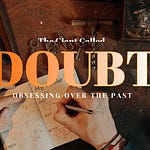Listen to the podcast version:
FAILURE IS NOT FINAL
Peter denied Christ, Moses struck the rock in anger, David committed grievous sin—yet each was redeemed and used mightily.
Failure, in God’s economy, is often the soil where humility grows and dependence deepens. Proverbs 24:16 declares, “Though the righteous fall seven times, they rise again,” reminding us that righteousness is not the absence of failure, but the persistence of faith. In Christ, failure becomes a refining fire—not a tombstone, but a turning point—where the believer learns to surrender pride, receive mercy, and walk forward in obedience.
THE BOY WHO CRIED WOLF
Throughout my childhood, the fear of failure was a constant companion—an invisible weight pressing down on every attempt, every ambition, every dream. I didn’t just fear falling short; I expected it. That fear became a lens through which I viewed the world and myself. Every assignment, every challenge, every opportunity felt like a trap waiting to expose my inadequacy. I wasn’t lazy by nature, but the fear paralyzed me. It whispered lies: “Why try if you’ll only fail?” And so, I hesitated, stalled, and avoided—hoping to escape the shame that seemed inevitable.
But deep inside, I knew I was at war. I fought against laziness with bursts of effort, trying to prove I wasn’t what others assumed.
Yet even my best attempts often ended in disappointment. I’d start strong, only to falter under the pressure of perfectionism and self-doubt. The sting of failure wasn’t just personal—it reflected in the eyes of those around me. Teachers, family, friends—they all expected more, and I couldn’t deliver. Their disappointment became my identity. I wasn’t just failing at tasks; I was failing at being enough.
Eventually, my external life began to mirror my internal defeat.
I lived in the shadows of my own expectations, surrounded by clutter—physical, emotional, and spiritual. My environment reflected the chaos within. I didn’t just feel like a failure; I built a life that confirmed it. But even in that mess, God was present. He didn’t recoil from my brokenness—He waited for surrender. And when I finally laid down the fear, the striving, and the shame, He began to reorder what I had buried beneath years of disappointment.
Looking back, it’s no wonder I earned the title The Boy Who Cried Wolf. I made promises I didn’t keep, started tasks I didn’t finish, and projected confidence I didn’t possess. My words outran my follow-through, and over time, people stopped believing me—not because they were cruel, but because I had trained them to expect disappointment. I cried, “I’ll do it!” when I hadn’t counted the cost, and “I’ve changed!” before surrendering to the One who could truly transform me. That title wasn’t just a nickname—it was my identity. It reflected a life of false starts, unmet expectations, and the painful gap between intention and obedience. But praise God, the Shepherd came for the boy who cried wolf—and He didn’t just silence the cry. He converted me into a warrior who fights the wolf.
FAILURE IS A GOOD THING
Failure, once my greatest fear, became the very doorway through which I encountered the sufficiency of Christ. For years, I tried to outrun it—masking it with effort, performance, and religious striving. But the more I tried, the more I failed. Eventually, I had to face the truth: I wasn’t just failing at tasks—I was failing at life itself. And in that moment of collapse, I discovered something sacred. Scripture says, “Apart from Me, you can do nothing” (John 15:5). I had read it before, but now I lived it. My failure wasn’t a curse—it was a reminder, revealing my desperate need for the indwelling life of Yeshua.
The Apostle Paul understood this paradox well. He wrote, “I will boast all the more gladly about my weaknesses, so that Christ’s power may rest on me” (2 Corinthians 12:9). Today, my favorite verse. That verse once baffled me. Why boast in weakness? But when I finally stopped pretending to be strong, I saw the beauty of His strength in me. My failures became altars—places where I laid down my pride and received His life. I stopped asking God to “help” me succeed and started asking Him to live through me. That shift changed everything. I no longer fear failure because I no longer trust in myself.
In the economy of heaven, failure is not the end—it’s the invitation. It’s the moment when self dies and Christ begins. Galatians 2:20 declares, “I have been crucified with Christ and I no longer live, but Christ lives in me.” That’s not poetic language—it’s spiritual identity. I am a failure without Him. But with Him, I am a vessel of glory. My story is no longer about overcoming failure—it’s about embracing failure and being overcome by grace. And now, when I stumble, I fall into Him.
That is the good news: failure brought me to the feet of Yeshua, and He did not reject me. He resurrected me.
Dear reader, if failure has been your companion, let it become your teacher—not your master. Scripture does not hide the failures of its heroes; it redeems them. David, Peter, Moses, Paul—all failed deeply, yet were restored fully. The difference was surrender. The truth is sobering: apart from Christ, we are failures. Not just in performance, but in identity. “Apart from Me, you can do nothing” (John 15:5) is not a poetic suggestion—it is redemption. The indwelling life of Yeshua is not a supplement to your strength; it is your only source of it.
Watch the video above. If it blesses you, consider donating to help us keep it free. HERE
So I challenge you: stop dressing up your messes. Stop pretending your delays are noble. Stop fearing failure as if it defines you. Instead, let it expose your need for the One who never fails. Own your weakness, and let Christ be your strength. “His power is made perfect in weakness” (2 Corinthians 12:9). That means your failure is not the end—it’s the beginning of divine order. Let Him reorder your life from the inside out. The time for pretending is over. The time for surrender is now.
Check our 90+ My Life essays and media content HERE.










